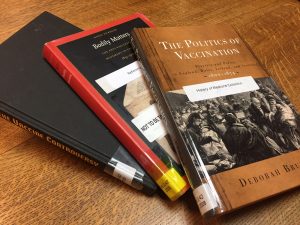Although today’s flu vaccine is generally accepted as part of a modern public health system, the longer story of vaccination is one of vociferous disputation and resistance.
The founder of vaccination is considered to be Edward Jenner – though earlier forms were practised in China, India and Turkey. In 1796 Jenner used cowpox material to create immunity to smallpox and in 1798 he published An Inquiry into the Causes and Effects of the Variolae Vacciniae. Despite opposition within the medical profession and religious aversion to the use of animal material, by 1801 his report had been translated into other languages and widely disseminated. Many thousands of people were vaccinated.
Vaccination programmes since then have contributed to the control or eradication of smallpox, polio, diphtheria, tuberculosis, tetanus, whooping cough, measles, mumps, rubella, meningococcus and pneumococcus. Recent vaccination programmes are combatting rotavirus, human papillomaviruses, and shingles.
In LSHTM Library’s Barnard Classification Scheme, books on vaccination are found within classmark “H”.
 Books on the pharmacology and therapeutic use of vaccines are at “HG”, and include:
Books on the pharmacology and therapeutic use of vaccines are at “HG”, and include:
- “Vaccinology : an essential guide” edited by Gregg N. Milligan and Alan D.T. Barrett (2015)
Books on the history and politics of the subject are at “HI”, and include:
 “Bodily Matters: the Anti-Vaccination Movement in England 1853-1907” by Nadia Durbach (2005)
“Bodily Matters: the Anti-Vaccination Movement in England 1853-1907” by Nadia Durbach (2005)- “The Vaccine Controversy : the History, Use, and Safety of Vaccinations” by Kurt Link (2005)
- “The Politics of Vaccination” by Deborah Brunton (2008)
If you’re interested in some truly impassioned writing on both sides of the vaccination debate, LSHTM Library has a collection of books and pamphlets from the 1800s. Digitised as part of the Medical Heritage Library project and hosted on the Internet Archive, they are freely available online and can be downloaded as facsimiles, searched through as full-text or formatted for e-pub readers and Kindle.
Here are a few “for” vaccination:
- Vaccination vindicated: being an answer to the leading anti-vaccinators by John C. McVail (1887)
- Vaccinæ vindicia or, defence of vaccination by Robert John Thornton (1806)
- Vaccination : its place and power by Thomas M. Dolan (1883)
and a few “against”:
- Vaccination and it’s evil consequences by John Morton (1875)
- Vaccination : a delusion by Alfred Russel Wallace (1898)
- Vaccination : a reply to the question is vaccination scientific? by George S. Gibbs (1884) – which ends with these words:








